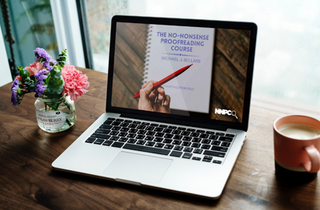|
So, you’ve got an interview for a proofreader position: how do you prepare?
I think I have a relatively unique perspective on the subject of proofreader job vacancy interviews, having sat in both chairs, so to speak. I have sat in the interviewee’s chair, and I have sat in the interviewer’s chair. Contrary to popular belief, both chairs are pretty intimidating places to sit. The interviewee’s chair for all the obvious reasons and the interviewer’s chair because, unknown to the interviewee, the interviewer is generally under a great deal of pressure to find the right applicant. Spare a thought for your interviewer! Publishing production departments are pretty industrious environments. In the popular imagination, they may well manifest as Parisian salons or as some kind of perpetual meeting of the Bloomsbury Group, red pen held loosely, a haven of thoughtful repose, but nothing could be further from the truth. The publishing production environment is all about delivering quality and accuracy to often seemingly impossible deadlines. It is not for the fainthearted. When a vacancy appears, it will be because a) a proofreader has left or b) the workload has increased, necessitating the addition of one or more proofreaders. Either way, there is generally no time to lose. So, although it will be incumbent upon you to demonstrate that you are made of the right stuff, the onus will also be on your interviewer to identify the right applicant. Having sat in both chairs, I have experienced both pressures. So, don’t worry too much: you’re won’t be the only nervous person in the room! Preparing for your proofreader position job interview As the not-so-old saying goes: fail to plan and you plan to fail. Job interviews are won or lost on the basis of how much or how little homework you do. Job interviews for proofreader positions are no different. The core areas you need to address are the three Rs:
1. Research It is vital that you get hold of as much information as you possibly can about the business you’re hoping to work for. Interviewers like to know that you understand their business. What's more, the nature of their business will dictate the nature of the proofreading you will be doing. If you think the processes and expectations are the same for proofreaders irrespective of where they work, you are, I'm afraid, very much mistaken. Although it goes without saying that you must portray yourself as a paladin of accurate spelling, faultless syntax and polished grammar, there are certain 'when push comes to shove' moments in any publishing environment that may require a degree of adaptability. Example: the boutique literary publisher For a boutique publisher of literary fiction, for example, the quality of the prose will be everything. You will be expected to point out dangling modifiers, split infinitives, passive voice and excessive use of adverbs. A boutique literary publisher stands or falls on the quality of its writing. Consequently, your performance as a boutique publisher's proofreader will be measured against your contribution to the quality of that writing. If you're not improving the publisher's output, why exactly are you there? Of course, you'll have to spot the usual spelling errors, typographical gaffes and inconsistencies of style as well, but you'll frequently find yourself treading a thin grey line between proofreading and editing. Example: the advertising agency If you're working in an advertising agency, on the other hand, whilst it is desirable that the prose be second to none, it will not be a core metric by which the business measures its success or failure. Advertising must, by its very nature, be persuasive. It must talk directly to its intended demographic. This might mean strict grammatical accuracy must be sacrificed in order to effectively communicate. The success or failure of marketing collateral is measured against the number of qualified enquiries it generates, not how many favourable reviews it receives. Although you may be tempted to replace the occasional 'who' with a grammatically accurate 'whom', you'll have to keep in mind that this is unlikely to play well with the masses. Short, sharp, to-the-point and informal is usually the order of the day. And by 'informal', I mean downright inappropriately attired. Example: the in-house marketing department If you find yourself in the marketing department of a large retailer, for example, the sheer volume of literature such outfits produce will pretty much define your existence in post. You'll more than likely be answerable to an Operations or Production Manager. She or he has only one goal in mind: hitting the print date. Anything that jeopardises this critical milestone will be greeted with outright hostility. Given the relatively short shelf-life of these kind of publications, a misplaced comma or hyphen will not be seen as sufficient reason to hold up production. Even though it may take only a few minutes to insert a single piece of punctuation into the brief description of a set of scatter cushions, the page in question will have to loop back through the production process and take its place at the back of what may well be a large queue. A correction that could in itself (in what production people refer to as 'touch time') take just a couple of minutes could (in 'elapsed time') be held up for hours or even days. So, before you head off to your interview, take a little time to assess the kind of work you're likely to be proofreading. Are they looking for a borderline OCD pedant or a workhorse who can spell? Even though quality is always desirable, is it as high on their list of priorities as a high work-rate and the capacity to compromise? It will go a long way if you can demonstrate that you understand their business objectives and are capable where necessary of aligning yourself with them, even when this goes against the grammatical grain. 2. Review By far the most common form of job interview these days is the 'competency-based interview', sometimes referred to as a 'behavioural interview' or 'situational interview'. Rather than asking you to simply list your technical merits, a competency interview will attempt to identify whether or not you possess certain 'key competencies'. These competencies will generally relate to the requirements of your job role but they can also touch on qualities that the company as a whole finds desirable, such as honesty or determination. The questions used in competency-based interviews usually follow the "Can you give an example of an occasion when..." format. It is essential, therefore, that you thoroughly review your past experience before attending an interview for a proofreading position. Although you can expect to be interrogated about your proofreading methods, what kind of material you've proofread in the past, your per-hour word rate and such, you may also find yourself on the receiving end of questions like:
Your ability to answer these questions will depend entirely upon how thoroughly you've reviewed your past experience for the positive contribution you've made to your previous employers' businesses. You'll be fine so long as you have an example relating to each of the following:
3. Role-play Once you've carried out your research and you've reviewed your resume not only for proofreading experience but also in order to address key competencies, you'll need someone with whom to role-play. Whoever you choose, make sure they are going to be honest and critical with you. Brief them with what you've discovered during your research so they can 'get in character'. You'll need to do at least three mock interviews. In the first, your interviewer should keep things light and go easy on you. The second should be a little tougher. The third and all subsequent role-plays should be rigorous with a few tricky questions thrown in. The Proofreading Test Most job interviews for proofreading posts will include a proofreading test. It is vitally important that you thoroughly prepare for this test. Don’t rely on your (doubtless exceptional)proofreading skills alone to get you through. It's about so much more than that. Once you’ve been made aware that there will be a proofreading test as part of your job interview, be sure to ask the following questions:
Proofreading tests tend to fall into one of two categories:
1. The Generic Proofreading Test This will be an extract from a novel, instruction manual or text book and will be entirely unrelated to the business with whom you’re hoping to secure a contract. Errors are likely to be liberally sprinkled throughout this text. As a rule, the test will be trying to measure the sharpness of your eye, your knowledge of grammar and your awareness of proofreading symbols. There will be obvious errors such as spelling mistakes, transposed words and rogue punctuation but there are also likely to be the kind of errors which require a thorough familiarity with proofreading symbols. So, expect problems with paragraph breaks, indents, inappropriate use of italics, excessive line spacing and such. There are also likely to be a few tricky errors, so look out for inconsistencies, such as the same name occurring with two different spellings or headings sometimes with all upper-case initials and sometimes with all lower case initials. And look out for the same word occurring on the end of a line and the beginning of the next line. I don’t know why but the people who set proofreading tests seem to love that one! 2. The Specific Proofreading Test This will resemble the generic tests in many respects, particularly the insertion of tricky errors. However, it is less likely to run the full gamut of proofreading symbols. The emphasis will be on the kind of errors that effect their business, particularly expensive errors. If the business in question is retail-based, for example, look out for weird pricing issues. If the company sells a technical product try as far as you can to make sure measurements add up. Obviously, this kind of technical detail will generally be checked by someone more qualified but the proofreader will often be viewed as ‘an extra pair of eyes’. It is also incumbent upon you to know as much about their business as can reasonably be expected. If the company produces a particular piece of machinery, read about it on their website or Wikipedia. If the company sells exotic musical instruments, familiarise yourself with unusual spellings, such ‘djembe’ and ‘mbira njari’. Even if something as specific as this doesn’t come up in the test, it may well prove of use in the interview itself. With the help of a friend, you can create your own proofreading tests for practice purposes. This is really simple. Just copy and paste information from the business's website into a word document and ask a friend to 'muss it up'. Tell them you want them to really try to catch you out, so the more subtle the errors the better. These ad hoc proofreading exercises kill two birds with one stone: testing your proofreading capabilities and helping you to familiarise yourself with the business. If in doubt, always, always, always, ask! Whether the test is generic or specific, remember to ask questions (on your proof or in person, depending upon the circumstances) if there is any doubt concerning a correction. For example, a name may have two different spellings. You can’t possibly know which is right. You can only draw attention to the inconsistency. Never simply plump for one or the other. If in doubt, always ask. A Proofreading Test is Like any Other Test As with any test, it is important that you:
And that's pretty much it. I think I've covered everything here. If there's anything you think I might have missed or, perhaps you've experienced a proofreading interview or test that went awry and would like to share your experience, please feel free to get in touch via the contact form. With proper preparation and plenty of practice, a proofreading interview and test can be a walk in the park. Best of luck! Mike Think you've got what it takes to earn £22 per hour or more as a professional proofreader? Why not give my proofreading course a try?
0 Comments
|
Details
Testimonials
“I am one of those many fools who paid a huge amount of money for a useless course. This book... has opened so many doors for me. I now look on Mike as my mentor as I embark on a career. Thank you Mike.” Emma Steel, Proofreader and International Structural Editor. “ I thoroughly enjoyed the course and am so glad that I decided to take it... the whole experience was invaluable. My proofreading service is now well established and your course played no small part in getting it off the ground.” Hache L. Jones, Proofreader. “I'd just like to thank you first of all for writing such a great, straight forward eBook, and then going above and beyond what I would even expect as a customer by providing us, completely free of charge, updated versions months later!” Rachel Gee, Trainee Proofreader. “What can I say? Worth every penny and then some! God Bless! This a fabulous course.” Teresa Richardson, Proofreader. “As someone who has effectively been proofreading for thirty years, I found Mike’s No-Nonsense Proofreading Course an invaluable introduction and a very useful practical guide to many aspects of this discipline. I can wholeheartedly recommend it as the ideal starting point, and much more besides.” Jeremy Meehan, Proofreader. Blog AuthorMy name's Mike Sellars and I'm an experienced proofreader and the author of The No-Nonsense Proofreading Course. Click here to find out more about me. The No-Nonsense Proofreading CourseA Fraction of the Cost of Other Proofreading Courses NOTE: Stock is currently limited to 10 per day, so we can continue to deliver exceptional after-sales service, answer queries and provide open-door support. Credit card and PayPal payments accepted. “As someone who has been proofreading for 30 years, I found Mike’s course an invaluable introduction and a very useful practical guide to many aspects of the discipline. I can wholeheartedly recommend it.” Jeremy Meehan, Proofreader. Still want to find out more? Click here. Proofreading Categories
All
Proofreading Archives
July 2024
|


 RSS Feed
RSS Feed
